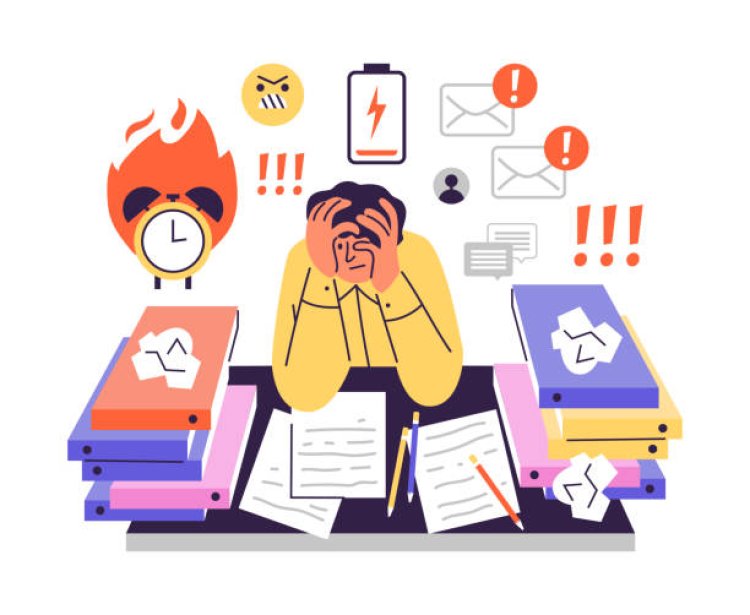How to Manage Burnout During Assignment Writing
Discover effective strategies to manage burnout during assignment writing. Learn practical tips to stay motivated, focused, and productive throughout your tasks.

Understanding Burnout During Assignment Writing
Burnout is more than just feeling tired after a long day of studying. It is a state of physical, emotional, and mental exhaustion caused by prolonged stress, often accompanied by a sense of reduced accomplishment and motivation. For students, assignment writing can be a significant contributor to burnout. With deadlines, complex topics, and the pressure to achieve high grades, it’s easy to feel overwhelmed.
Recognizing the early signs of burnout is crucial. These can include persistent fatigue, difficulty concentrating, lack of motivation, irritability, and even physical symptoms like headaches or sleep disturbances. Identifying burnout early allows you to take proactive steps to manage it before it impacts your academic performance.
Common Causes of Burnout in Assignment Writing
Several factors can contribute to burnout among students, especially during periods of intense assignment writing:
1. Heavy Workload
Students often juggle multiple assignments, exams, and personal responsibilities simultaneously. Trying to tackle everything at once can lead to exhaustion and a decreased ability to focus.
2. Lack of Time Management
Poor planning or procrastination often results in last minute cramming and all night study sessions. This not only affects productivity but also increases stress levels.
3. High Expectations
The desire to achieve top grades or meet personal and external expectations can put undue pressure on students. This pressure often results in perfectionism, which can be mentally draining.
4. Inadequate Support
Some students lack access to academic guidance or peer support. Without proper help, even manageable assignments can feel overwhelming. Seeking resources like cipd level 3 assignment help can provide structured support and reduce stress during challenging tasks.
Strategies to Manage and Prevent Burnout
Effectively managing burnout requires both immediate coping strategies and long term preventive measures. Here are some practical steps students can take:
1. Create a Realistic Schedule
Developing a structured study plan helps manage your workload more effectively. Break assignments into smaller, manageable tasks and allocate specific time slots for each. Ensure your schedule includes breaks to rest and recharge.
2. Prioritize Tasks
Not all tasks carry the same weight or urgency. Identify which assignments are most important or have closer deadlines, and tackle them first. This approach prevents last minute stress and ensures you can focus on high priority work.
3. Take Regular Breaks
Working for long periods without rest can diminish productivity and increase stress. Use techniques like the Pomodoro method 25 minutes of focused work followed by a 5 minute break to maintain mental clarity and reduce fatigue.
4. Practice Self Care
Physical health directly affects mental performance. Ensure you get adequate sleep, eat balanced meals, and engage in regular physical activity. Simple practices like stretching, walking, or meditating can significantly reduce stress levels.
5. Stay Connected
Social isolation can worsen burnout. Share your experiences with friends, family, or study groups. Discussing challenges can provide emotional relief and often leads to helpful insights or solutions you might not have considered.
6. Adjust Your Mindset
Perfectionism can be a significant driver of burnout. Remind yourself that doing your best is more important than achieving flawless results. Focus on learning and progress rather than solely on grades.
Practical Techniques to Boost Productivity
Beyond managing stress, improving productivity can help reduce the feeling of being overwhelmed. Consider the following methods:
1. Set Clear Goals
Define what you want to achieve in each study session. Clear goals help maintain focus and provide a sense of accomplishment once tasks are completed.
2. Minimize Distractions
Identify what typically interrupts your workflow social media, notifications, or noisy environments and take steps to reduce these distractions. Consider apps or tools that block notifications during study periods.
3. Use Study Aids and Resources
Leverage online resources, academic tools, and assignment help services to make your study sessions more efficient. Resources like cipd level 3 assignment help can guide you through complex topics and reduce unnecessary stress.
4. Reflect and Adjust
At the end of each study period, evaluate what worked and what didn’t. Adjust your approach based on your observations to enhance productivity and reduce burnout over time.
When to Seek Professional Help
Sometimes, burnout goes beyond what self care and study strategies can manage. Persistent feelings of anxiety, depression, or extreme fatigue should not be ignored. Consulting a mental health professional, counselor, or academic advisor can provide targeted support. Universities often offer free counseling services specifically for students dealing with stress and burnout.
Maintaining Long Term Academic Wellbeing
Managing burnout is not just about surviving assignment deadlines; it’s about developing sustainable habits for long term academic success. By balancing study, rest, and personal life, students can maintain their mental and emotional health while achieving their academic goals.
Key Takeaways
-
Recognize the signs of burnout early to address them effectively.
-
Organize your workload and prioritize tasks to prevent overwhelm.
-
Take care of your physical and emotional wellbeing through rest, exercise, and social support.
-
Use professional resources and assignment help services to reduce unnecessary stress.
-
Focus on progress, not perfection, to maintain motivation and resilience.
By incorporating these strategies, students can approach assignments with clarity, efficiency, and confidence, ultimately reducing the risk of burnout and promoting a healthier, more productive academic experience.


 toylorharrisuk1
toylorharrisuk1 



















